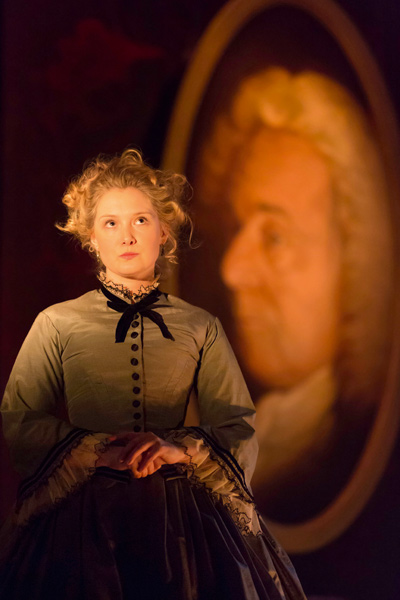It’s been a while, I have to say, but last week I saw a show that thrilled me to the core. Trelawny of the Wells, the Donmar’s latest offering, is a tribute to the theatre written by actor-turned-writer Arthur Wing Pinero. A simple set-up. Gorgeous young luvvie, Rose Trelawny, has forsaken the greasepaint to marry a greaseball called Arthur Gower. He’s loaded. Rosie’s actor chums treat her to a farewell bash complete with antique gags, tuneless ditties, snatches from half-remembered dramas and long-winded orations consisting entirely of in-jokes. (You’ll have spotted that this is not the show that thrilled me to the core.) At one point, a tragedian holds a baguette over his head and scuffs the inner pith with a fork to create a shower of confetti while he shouts, ‘Snowstorm! Snowstorm!’ This is the scene’s most gripping moment.
Next we follow Rose as she moves in with Arthur’s priggish elderly relatives. Sir William Gower and his partially mummified sister, Trafalgar, enforce an atmosphere of cheerless solemnity in their chocolate-coloured drawing-room. A hundred years ago these jingoistic nuisances were probably hilarious. Not any more. The contrast between vivacious Rose and her surly in-laws is presented with sledgehammer subtlety and the achingly dull scene gropes towards two feeble climaxes. First, a game of whist is violently disrupted, which sends the creaky old Gowers off to bed. Second, Rose’s acting friends invade the house and the Gowers wake up again — the last thing anyone wanted — and chase the luvvies away. In the final act we return to the theatre where a new play is being co-directed by a gifted young writer. His efforts are disrupted by a stupid, noisy Kerryman whose charmless shrieking is a slur on Ireland’s finest county.
Joe Wright, a film director, orchestrates this binge of actorly posturing with an indecisive hand. The first act is all frivolous pastiche, while the second aims for emotional truth and pathos. This creates a hell of an uncertainty in the spectator’s mind and makes the play inscrutable and even rather heartless. Not that this matters to the cast. Up on stage, the actors are having a right old hoot playing a bunch of actors having a right old hoot, and the audience becomes a complete irrelevance. I can imagine only one use for this hysterical exhibition: aversion therapy. If you have kids considering a career on stage, take them along to the Donmar. Should they persist in their hankering for the boards after enduring this yelpy shindig, then you’d better surrender to the inevitable.
Soho Theatre is a hardworking venue, which occasionally uncovers a gem. God’s Property is set in a Deptford flat in 1982 where a nervy young skinhead, Ono, is confronted by an older intruder, Chima. Knives are pulled and the pair circle each other warily. Then Chima identifies himself as Ono’s older brother, who has returned after serving ten years in jail for an unnamed crime. The brothers are mixed race — ‘half-caste’ in Eighties lingo — and Chima gently mocks Ono for adopting skinhead costume to blend in with the local thugs. ‘Somehow you’re dressed exactly like the white mannequin in the shop window.’ What’s remarkable about this mundane encounter is the emotional depth of the brothers’ troubled relationship and the concentrated eloquence of their rhetoric. Chima delivers a blistering account of his experience as a mixed-race inmate trying to find allies in a jail divided between white and black gangs. Ono’s friend, a girl named Holly, shows up and Chima withdraws tactfully. There follows a 20-minute passage of scintillating comedy as Ono and Holly, both excruciatingly bashful, attempt to reach the beginnings of a sexual understanding.
Chima returns and the drama builds towards its violent conclusion as we learn the truth about his past and the culprits he has come to avenge. The ending is, perhaps, a bit overheated but this is the tiniest of quibbles. It’s rare to find a play that aims at so many targets — comedy, melodrama, romance, suspense and social observation — and hits them all so sweetly. Michael Buffong handles the cast with great assurance on a small and gorgeously grimy set. Kingsley Ben-Adir brings grace and nobility to the role of Chima, who by the end has acquired the epic grandeur of Ulysses. And Ria Zmitrowicz’s hilarious performance as Holly will attract devotees from across Soho and beyond. An exquisite turn.
The author, Arinze Kene, was born five years after his play is set in 1982. I was a teenager in the early 1980s and I can tell him that he captures the moment with faultless precision. At the curtain call, the audience roared and roared. And then they roared some more. Infallible proof that this show is bang on the money.







Comments